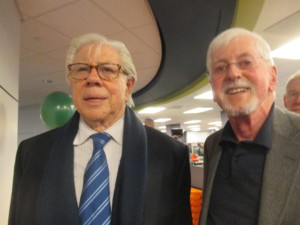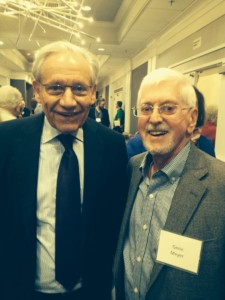Recalling Watergate and “Woodstein” after 50 years
June 17, 1972 was not Dec. 7, 1941, nor was it Sept. 11, 2001, or Jan. 6, 2021. But it remains a date that will live in infamy, and in countless histories and memoirs. That was when burglars broke into the Democratic National Committee headquarters in Washington’s Watergate office building–and got caught. Eventually, the Watergate break-in was linked to the Nixon presidential campaign, and the president’s role in the coverup ultimately led to his resignation. Bob Woodward and Carl Bernstein, my Post colleagues, played a major role in the story and became rich and famous in the process. They were instrumental also in the Post receiving the Pulitzer Prize for its Watergate coverage. I was largely a bystander in this drama but with close ties to both. In my work-in-progress memoir, I offer my own perspective on those historic events and the two reporters who wrote truth to power. Here is an excerpt.
Bob Woodward entered the Washington Post newsroom nervously in August 1970, a few months after I had arrived at the same place. His entrance was tentative, however, a two-week tryout. I had had one of those five years before, as a reporter on the City Desk of the New York Herald Tribune. Mine had ended badly when, in the middle of my short time, a three-newspaper merger was announced that would swallow and ultimately kill the Trib. There was no job to be had.
Bob’s Post try-out also ended badly, but for different reasons. He was assigned a desk near mine in the Post’s city room on the fifth floor of the newspaper’s old L Street building. Near us were “Chal” Roberts, the veteran correspondent who had his own office but was not the least bit standoffish; Jack Eisen, the transportation reporter who made a career out of covering the birth of Washington’s subway system, while quarreling with his wife Lucy over the phone; and Dave Hardy, a brash young black reporter from Newark who wisecracked his way through the newsroom.
I was less green than Woodward, having spent four years and four months as a reporter for the Philadelphia Evening Bulletin while Woodward was serving his time in the Navy and, as things turned out, cultivating the man who would later be Deep Throat. But Mark Felt’s special place in the life of Bob Woodward was yet to come. For now, the Bob Woodward I met was anxiously seeking employment at the largest of the capital city’s then three newspapers. He returned from one assignment, the subject of which I cannot recall but which most certainly wasn’t the White House, wrote a story on one of the large manual typewriters we all used (even electric typewriters were still in the future) and showed it to me. I was impressed with the information he had managed to gather and put on paper, but all his facts were in no particular order. It was a mess.
Years later, they used to quip that English was Woodward’s second language. But Bob was such a good – no great – reporter that ultimately it did not matter. Except that it did matter during that brief tryout. Metro Editor Harry Rosenfeld told him he needed some work on a newspaper farm team before he could play in the Major Leagues. He dispatched Woodward to the Montgomery Sentinel, a suburban weekly, to learn the craft. After a year, Woodward had amassed an impressive file of clips and in the persistent way that would win him accolades and more, he convinced Harry to hire him.
Woodward’s return to the Post newsroom was unheralded. He still had a lot to prove. Assigned to the City Desk, he burrowed into the District government, not as a beat reporter but as a digger, a searcher for truth in the arcana of official documents. Most notably, he investigated local restaurants and found them to be woefully unhealthy. There were other stories of a similar ilk. And then, on a sultry weekend in June of 1972, there was the Watergate break-in. Ultimately, it would be tied to the White House and to its political arm, CREEP, the Committee to Re-Elect the President.
District Editor Barry Sussman – who would be written out of the “All the President’s Men” movie script, nor would he edit the best selling book that inspired it and was still bitter over the omissions years later – called in Woodward to supplement the reporting of police reporter Al Lewis. Carl Bernstein, sensing a big story, also showed up in the newsroom to help out. Bernstein was a facile writer but had the reputation of being lazy. He was given to napping on the couch in the District Building press room (once the then District Editor Steve Isaacs had walked in on him in full snooze) but could he write. I recall one unusual story in particular, a portrait of the “Wesorts,” a close-knit clan of Southern Marylanders who were part-Indian, part-black, part-white, what anthropologists referred to as tri-racial isolates. It was a unique public glimpse at a very private community.
Carl, a college drop-out who had started as a dictationist for the old Washington Evening Star, was the son of hardcore left wingers. Bob, on the other hand, was a Yale-educated son of a judge, a product of the Establishment. They were an unlikely pairing, the right-brain linear thinker Woodward and the left-brain unmanageable free-spirited Bernstein. So different, but in the newsroom, their identities and names merged into “Woodstein.”
Tip by tip, day by day, they advanced the Watergate story while other papers largely ignored it, until at last the story took on a life of its own. It was an exciting time at the Post, especially when other players – U.S. District Court Judge John Sirica, the House Judiciary Committee, Senator Sam Ervin and top Senate investigator Sam Dash – entered the fray.
The downside, for those not working on the big story, was what were called “Watergate deadlines.” That meant anything unrelated to Watergate had to be filed much earlier, sometimes as early as 4 p.m., and had no shot at the front page. Looking back after half a century, this observation, more a complaint, seems trivial. But in the moment it was a small part of the story, or at least of my story during the drama that riveted the nation and came to be known as Watergate.


Love it Gene
Loved this glimpse into journalism history! Thank you for sharing
Was it preordained fate or a random series of events that brought these two distinctly different journalists together? Regardless, the creation of Woodstein was an historically valuable pairing. Gene, thank you for the insider’s view of history in the making. This was a great read!